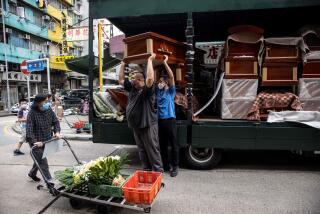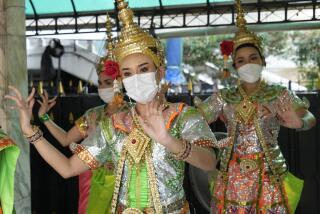SARS Has Asia in Grip of Panic
- Share via
INCHEON, South Korea — On Cathay Pacific Flight 410 from Hong Kong to Seoul, lawyer Jonathan Hatch skipped lunch because to eat would have necessitated removing his surgical mask.
The mask also kept him from chatting with other passengers, although if he had, he might have yelled at the fellow several rows ahead who had the temerity to sneeze, sending ripples of anxiety through the cabin.
“I wouldn’t say I’m exactly scared,” said Hatch, 34, a Chicago-born lawyer who admits that upon arriving at Seoul’s international airport in Incheon the first thing he did was wash his hands with soap to disinfect. “But things are definitely getting bizarre.”
The mysterious new pneumonia known as severe acute respiratory syndrome, or SARS, is sowing panic at an even faster pace than the rate of new infections. Throughout Asia, surgical masks have become the fashion accessory of the season. Some airlines are starting to hand them out to passengers on flights between affected areas -- like Hong Kong -- even before the peanuts and the headphones.
Air travel is especially suspect because of the close quarters and because of its potential to allow infectious diseases to trot the globe with frightening efficiency. In San Jose, an American Airlines flight from Tokyo was quarantined on the runway Tuesday after four people who had come from Hong Kong were suspected of having the illness. It turned out to be a false alarm, but this incident illustrates just how deep the paranoia is running.
Conferences are being postponed, vacations canceled and business plans torn up to an extent that some economists believe the virus could depress world markets more than the war in Iraq.
Among the high-profile travelers who have shelved Asia tours of late are the Rolling Stones and Vice President Dick Cheney, whose spokeswoman gave the Iraq war as the main reason for postponing a two-week trip this month to China, South Korea and Japan. Fear of the disease has led many companies to restrict travel to Asia, while others are asking families of employees working in Hong Kong to return home.
The World Health Organization issued a rare warning on Wednesday for travelers to avoid Hong Kong and China’s Guangdong province, where the largest number of cases have occurred; and said it did not believe the disease had peaked.
Malaysia ordered a freeze on the hiring of foreign workers from affected countries while Hong Kong and Singapore continued to keep schools closed and thousands of people under quarantine. Hong Kong officials placed some people in a quarantine camp.
In Indonesia, health authorities said there are four suspected cases of the disease. They plan today to declare SARS a national epidemic threat.
Controlling the spread of the disease poses a major challenge for Indonesia, the world’s fourth-most populous country. Many doctors are poorly trained and the health-care system is overloaded. Rather than see a physician, many Indonesians prefer to go to traditional faith healers who are less likely than doctors to recognize or report SARS cases.
Thailand, meanwhile, said it would bar any tourist showing symptoms of the illness and require all visitors from the most-affected areas to wear masks while they stay in the country.
“Until a few days ago, I would have told you that people are doing a good job of shrugging it off, but now it has gone from being an irritant and mildly upsetting to quite a downer,” said Geoffrey Barker, chief economist at HSBC in Hong Kong.
He said his firm has rearranged its offices so employees are separated from one another, the idea being if one floor gets quarantined, others can carry on with the firm’s business. Most of his firm’s employees are wearing masks and some carry cotton swabs so that they don’t have to push elevator buttons with their fingers.
“It feels like a hospital ward here. It’s hard to know what is being reasonable and what is paranoia,” said Barker.
Hong Kong is at the epicenter of the panic with schools ordered closed and many employees ordered to work from their homes. A prank by a teenager who e-mailed people a fictitious newspaper story on Tuesday claiming the entire city was going to be quarantined triggered a plunge in the stock market and a massive run on the grocery stores as people rushed to stockpile food.
Chillingly, after 200 cases of the illness were discovered in one apartment complex, Hong Kong authorities began to move people who might have been exposed to a quarantine camp north of the city.
“When they start putting people on buses and taking them away, it takes you aback,” said Mary Schroeder, a Hong Kong business consultant.
Describing the atmosphere of suspicion, Schroeder said she was in a movie theater last week and sneezed, prompting a couple who had been sitting nearby to move away. About 15 minutes later, she sneezed again and the couple moved further away.
Hong Kong residents reported finding themselves ostracized when they go abroad. One, a Hong Kong banker, flew 12 hours to Europe last week for an important meeting to discover his client was too fearful to see him in person. They met by conference call instead, although they were in the same building.
Several major financial firms have lowered their economic growth forecasts for Asia this week, with China, Hong Kong, Singapore, Thailand, Vietnam and Malaysia among the hardest hit.
The panic is affecting even countries where there have been no cases of the disease reported, such as Korea and Japan.
David Patten, a London-based economist who is getting married this weekend to his Korean fiancee in Pusan, South Korea, said that even his own father had threatened not to come to the wedding because of the epidemic.
“There are 3 billion people in Asia and maybe 2,000 cases. I think people are worrying too much,” said Patten.
“People either don’t react or then when they do, they overreact,” complained the manager of one five-star hotel in Seoul who has seen occupancy fall in recent days.
Korean health authorities are taking strict measures to prevent the contagion from seeping in through the borders, but they conceded that it is most likely a losing battle in this age of globalization.
In normal times, some 60,000 people travel each day through Incheon Airport. Arriving passengers are being asked to fill out a form indicating if they have fever, coughing or shortness of breath -- symptoms of SARS -- but the system is voluntary and doctors believe it possible that somebody could be carrying the disease without knowing it.
“It is only a matter of time before SARS occurs in Korea, no matter how well the quarantine procedure is implemented,” Kim Moon Shik, director of the Korean National Health Institute, said Wednesday. “But since the epidemic is not really spreading in the air, if we wash our hands and maintain hygiene, we don’t have to panic.”
Health officials have said SARS is not nearly as contagious as, for example, the common cold. The disease so far has killed an estimated 78 people and sickened 2,151; the far more common influenza is believed to kill more than 250,000 people around the world each year.
But such statistics are not reassuring people whose nerves have already been set on edge by terrorism, war and recession.
In Tokyo, Eiko Sato, a spokeswoman for Kinki Nippon Tourist Co., one of the major Japanese travel agencies, said bookings over the next few months are at 30% of last year’s levels.
“It is not only the mystery pneumonia, but the war against Iraq and especially Japan’s poor economy. It’s difficult to specify the reason people are canceling,” said Sato.
Ayako Mikuniya, a 32-year-old Tokyo officer worker, who recently canceled a vacation in Singapore, said, “A trip can always be rescheduled as long as we’re alive.”
One bright spot in efforts to control the illness appears to be in Vietnam, where authorities said no new case of SARS has been reported in nine days. Officials attributed Vietnam’s apparent success to quick action by health authorities.
Soon after the first victim arrived in Hanoi, Dr. Carlo Urbani of the WHO recognized the danger of the illness, sealed off the hospital and sounded the global alarm.
Urbani, who initially examined the patient without wearing a mask and gown, subsequently came down with the disease and died Saturday in a Bangkok hospital.
Two doctors and two nurses also died from the ailment in Hanoi.
The determination in Vietnam to fight the syndrome kept it from spreading beyond the city and the initial 64 reported cases. Officials said 35 patients have recovered while 19 remain hospitalized.
“We decided to close the hospital and we told ourselves we would fight the beast,” Dr. Jean-Francois Caveau, a respiratory disease specialist, told France’s Europe 1 radio.
“It must sound crazy, but I’m proud of what we did,” he said. “We wanted to wipe out the epidemic and the best way was to close ourselves in. It was a living hell but I came out of it and we have succeeded in ridding Hanoi of the epidemic.”
*
Rie Sasaki and Hisako Ueno in Tokyo and Tammy Wong in Hong Kong contributed to this report.
More to Read
Sign up for Essential California
The most important California stories and recommendations in your inbox every morning.
You may occasionally receive promotional content from the Los Angeles Times.













